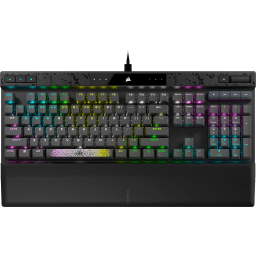CORSAIR K70 MAXのリリースに伴い、当社の新しいMGX磁気メカニカルキースイッチをお披露目いたします。
箱から取り出しただけでは、このキーボードには標準的なリニアメカニカルスイッチが搭載されているだけだと勘違いしても仕方がないでしょう。しかし、見た目や指先の感覚だけではわからない機能が搭載されています。では、その機能について詳しく見ていきましょう。
CORSAIR MGXキースイッチの動作原理は?
この質問に包括的に答えるには、まず従来のキースイッチの仕組みについて簡単に説明する必要があります。そうすれば、違いがより明確になります。
通常のキースイッチには、スイッチがアイドル状態の時には離れている2つの導電性金属接点があります。スイッチが押されると、これらのプレートが互いに接触し、電気回路が完成し、キーが押されたことが記録されます。

当社のMGXスイッチは、全く異なる仕組みで動作します。金属板が接触して回路が完成することはありません。代わりに、磁石を使用しています。これは、スイッチの底部に磁石がどの程度離れているかを非常に正確に感知できるセンサーがあるため機能します。磁石が事前に設定された距離に達すると、キーが押されたことが認識されます。
おそらく、この先どうなるかお分かりでしょう。作動点は可動磁石によって決定され、物理的なメカニズムではないため、キーごとに作動点をどこにするかを決定することができます。これがMGXスイッチの主な特徴ですが、それだけではありません。
CORSAIR MGXスイッチの仕様と機能
メカニカルキーボードファンにとって、スペックは最も重要です。そこで、MGXスイッチの触感について、期待できることをご紹介します。
- スイッチの種類:リニア
- 作動力:30g - 55g。( 作動ポイントが0.4mmに設定されている場合、 そこに到達するには30gの力が必要です。3.6mmでは55gの力が必要です。基本的に、作動ポイントが深いほど、より大きな力が必要です。)
- プリトラベル/動作点:0.4mm~3.6mm、 0.1mm刻みで調整可能。(出荷時の動作点は2.0mm)
- 総移動量:4.0mm
- 耐久性:1億回のキーストローク
つまり、箱から取り出した状態では、これらは通常の直線型キースイッチと同じように感じられますが、実は楽しい機能が隠されています。iCUEを使用すれば、キーごとに0.1mm単位で作動ポイントを調整できますが、磁石式設計のもう一つの利点は、複数の作動ポイントを設定できることです。




皆さん、そうです。通常のキースイッチでは、作動するまで押し続けるだけで、それが機能のすべてです。しかし、CORSAIR MGXスイッチでは、別の作動ポイントを設定し、別の機能に完全にバインドすることができます。iCUEを使用すれば、これらの設定を各キーに対して個別に行うことができますが、なぜそうしたいのでしょうか?現実的なメリットは何でしょうか?
例えば、FPSゲームを例に考えてみましょう。通常、Wキーを押すと歩き、Shiftキーも同時に押すと走ります。しかし、MGXスイッチでは、Wキーを押すと、1回目の作動ポイントでは歩き、2回目の作動ポイントでは走るように設定できます。しゃがむ、伏せる場合も同様です。コンソールゲームの世界からPCゲームの世界に新たに加わったゲーマーにとっては、ほとんどのコントローラーが同様の機能を持っているため、これは非常に便利な機能です。
MGXスイッチによる動作点の変更方法
アクティベーションポイントを独自に選択すること、そして実際に2つ目を追加できることは、あまり馴染みのないことなので、その方法について簡単に説明します。

- iCUEを開き、K70 MAXとiCUE自体のファームウェアが最新であることを確認してください。
- iCUEのK70 MAXタブを開き、「Key Actuations」設定を見つけます。
- 変更したいキーを選択します(または、個々のキー操作が必要ない場合は、キーボード全体にボックスをドラッグします)。

- スイッチ画像の右側にあるスライダー、または上のテキストボックスを使用して、作動ポイントを選択します。0.4mm~3.6mmの範囲で設定でき、この範囲内では0.1mm刻みで設定できます。つまり、32通りの作動ポイントが考えられます。いろいろ試して、自分に合ったものを見つけてください。
リセットポイントは、動作ポイントより上であれば、0.1mm単位で設定することも可能です。つまり、このキーボードは、キーごとに調整して、個人のニーズや好みに合わせて完全にカスタマイズできるのです。では、2つ目の動作ポイントについてはどうでしょうか?

- 2つ目の動作を設定する必要はありませんが、追加の機能として楽しむこともできます。これを行うには、「2つ目の動作ポイント」オプションをチェックし、1つ目と同じ手順を繰り返します。2つ目の動作ポイントを使用するには多少の練習が必要ですので、プロのピアニストのような器用さをお持ちでない場合は、スイッチをかなり下まで下げた位置に設定することをお勧めします。

CORSAIR MGX 磁気キースイッチに関するよくある質問
お時間のない方のために、MGXスイッチに関する素早い質問をいくつかご紹介します。
MGXスイッチ搭載のキーボードは?
現在、MGXスイッチは新しいK70 MAXでのみ利用可能ですが、将来的には他のキーボードにも搭載されるかもしれません。
MGXスイッチはホットスワップ可能ですか?
現時点では、そうではありません。この記事を書いている時点では、MGXスイッチはCORSAIR K70 MAXでのみ利用可能ですが、将来的には変更される可能性があります。
MGXスイッチはサードパーティ製のキーキャップと互換性がありますか?
はい。スイッチ自体は、るつぼ部分を含め、従来のCherry MXスタイルのキースイッチと同じ寸法です。そのため、お気に入りの高級カスタムPBTキートップをお持ちであれば、CORSAIR MGXスイッチにも装着できます。
作動点を変更するにはソフトウェアが必要ですか?
はい。2つの独立した作動ポイントを設定し、それを変更する機能はソフトウェアによって制御されています。物理的に調整することはできません。MGXスイッチを最大限に活用したい場合は、iCUEをダウンロードする必要があります。
MGXスイッチはRGBですか?
CORSAIR MGXスイッチには、一部のスイッチに搭載されているような独自のLEDは搭載されていませんが、筐体は半透明です。さらに、透明パネルで覆われたスイッチを貫通する隙間があります。これにより、K70 MAXの回路基板に搭載されたRGB LEDが遮られることなく光を放つことができます。
製品登録
